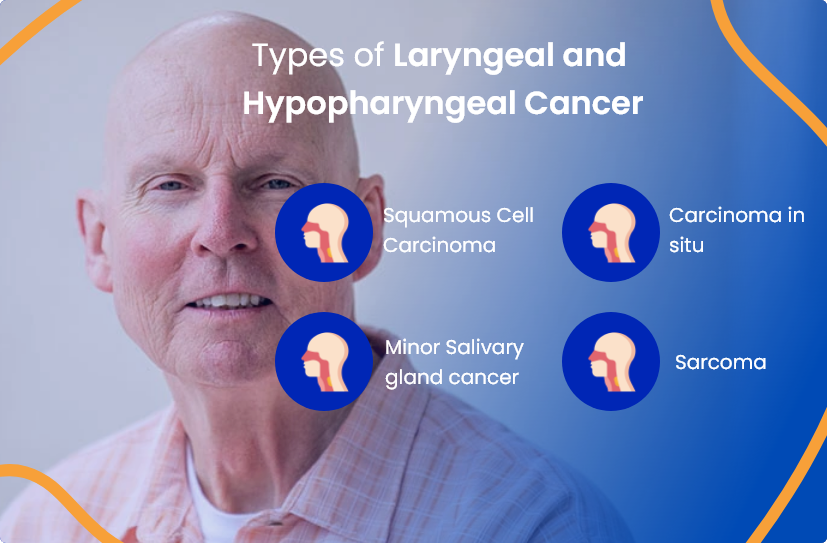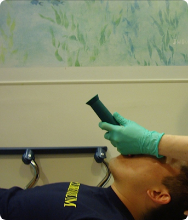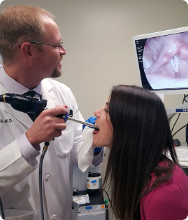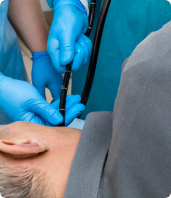
Book a Consultation
Thank you!
Your form has been sent successfully.

According to the American Cancer Society, laryngeal and hypopharyngeal cancer are common types of head and neck cancers that affect the vocal cords and lower region of the throat. Laryngeal cancer occurs in the larynx (voice box), and hypopharyngeal cancer develops in the hypopharynx (lower part of the throat that surrounds the larynx). The larynx contains the vocal cords that help us speak and protect the airway while swallowing. The hypopharynx is the esophagus's entry point, which takes food around the larynx into the esophagus and not into it.
Based on the origin of the cells, some of the most common types of larynx and hypopharynx cancer are:

Squamous Cell Carcinoma is the most common larynx and hypopharynx cancer that occurs in the thin, flat-lining cells called squamous cells.
It is the earliest stage, affecting only the larynx and hypopharynx lining cells. If left untreated, they can invade the deeper layers and spread to other parts of the body.
It develops in the minor salivary glands of the larynx and hypopharynx. These glands produce mucus and saliva to lubricate and moisten the area.
It is rare and starts from the connective tissue of the larynx and hypopharynx.
Common signs and symptoms of voice box cancer may include:
 Hoarseness of voice
Hoarseness of voice
 Enlarged lymph node in the neck
Enlarged lymph node in the neck
 Difficult and noisy breathing
Difficult and noisy breathing
 Persistent sore throat
Persistent sore throat
 Difficulty in swallowing
Difficulty in swallowing
 Pain in ear
Pain in ear
 Bad breath
Bad breath
 Choking
Choking
 Unexplained weight loss and fatigue
Unexplained weight loss and fatigue
Laryngeal cancer treatment options depend on the type and stage of cancer and the overall health of the patient.

Oncologists surgically remove the entire tumor and a minimum of 2 millimeters of cancer-free tissue surrounding the affected area. The extent of surgery depends on the location, stage, and area of the body involved.
Radiation therapy uses high-intensity radiation to destroy cancerous cells. It is mostly used after the surgical removal of the tumor to eliminate any leftover microscopic cancer cells.
Chemotherapy uses systemic drugs to destroy cancer cells. The medications are delivered through the bloodstream or orally to treat the disease.
Targeted drug therapy explicitly targets specific cell proteins or genes that block the growth and spread of cancer. It causes fewer side effects and spares healthy cells because of its specific action.
Immunotherapy treatment, also called biologic therapy, uses a specific protein to enhance the patient's immune system cells' ability to target and destroy cancer cells.
The following tests and procedures may be recommended depending on the symptoms of laryngeal cancer, age, and general health of the patient:

A laryngoscope (direct laryngoscopy) or a long-handled mirror (indirect laryngoscopy) is used to view the larynx and its nearby structure. The mouth and throat are anesthetized before the procedure to prevent gagging.

It is a fiber-optic technique where a flexible, lighted tube is inserted through the anesthetized nose or mouth to view the vocal box. It detects motion abnormalities and changes in vocal cords even before they are visible to the naked eyes. It also locates and determines the size of the tumor.

A biopsy is a definitive diagnosis of cancer that includes the removal of a tissue sample for microscopic examination. A biopsy can be performed using a fine needle to remove tissue fluid or cells from the suspicious area (FNAC) or surgical removal of a part or entire tumor.

A biomarker test is a molecular test that identifies specific genes, proteins, and other factors that are unique to laryngeal carcinoma.

High-intensity radiation is used to produce detailed 3-dimensional computerized images. They are used to locate and measure the tumor's size. Various imaging tests used are:
The cancer specialists at ACTC in Florida offer outstanding patient care by prescribing personalized and evidence-based treatment plans tailored to individual patients' needs. We aim to foster a positive environment that focuses on physical and mental health throughout a cancer patient's journey.
The following are our providers who you can consult at ACTC:

MD, Hematology & Oncology

MD, Ph.D., Hematology/ Medical Oncology

MD, Radiation Oncologist

If you or a loved one has been diagnosed with laryngeal cancer, a detailed discussion with your primary physician will help you understand your condition better. Your primary care doctor can then refer you to an advanced specialty center, such as ACTC in Florida.
As one of Florida's best cancer centers, we understand how a cancer diagnosis and therapy impact a person's physical and emotional well-being. Therefore, we work hard to make patients and their families feel secure. We understand how imperative it is for you and your loved one to make informed choices and play an active part in your medical care. We at ACTC strive to support you at every step of diagnosis, staging, treatment, and long-term follow-up in one convenient location. Our cancer specialists are backed up by qualified clinical staff with over two decades of experience and a reputation for providing personalized vocal cord cancer treatment.
Schedule a consultation by calling
 352-345-4565
352-345-4565
It is a common type of head and neck cancer. According to the American Cancer Society, it occurs more often in men than in women.
Increased intake of tobacco, alcohol, occupational inhalants (like asbestos, wood dust, and paint fumes), poor nutrition, and genetic and viral factors increase the risk factor for vocal cord cancer.
Although there are no proven ways to prevent larynx cancer, you may lower its risk factors by avoiding smoking and alcohol and preventing HPV infections.
Schedule a consultation by calling
 352-345-4565
352-345-4565